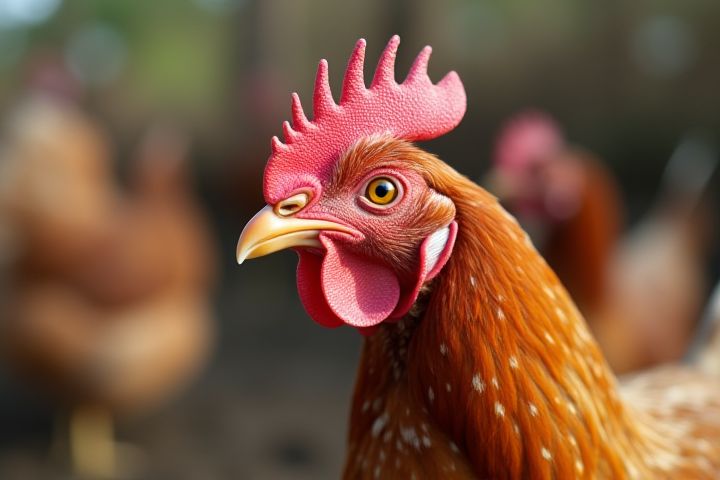
Poultry farming in Nigeria is a crucial sector within the agriculture industry, contributing significantly to food security and economic growth. The country ranks among Africa's largest producers of poultry, with chicken, turkey, and eggs being the primary products. Nigerian farmers increasingly adopt modern practices, including biosecurity measures and innovative feeding techniques, to boost production and minimize disease outbreaks. You may find that major challenges in the industry include high feed costs, inadequate infrastructure, and inconsistent supply chains, which can impact profitability. Governments and private sectors are actively working to improve these conditions, offering support through training programs and access to funding for aspiring poultry farmers.
Climate adaptation
Poultry farming in Nigeria is increasingly centered on climate adaptation strategies to enhance productivity and sustainability. Farmers are implementing practices such as improved housing designs, which provide better ventilation and temperature control, thereby reducing heat stress on chickens. Additionally, utilizing climate-resilient feed formulations helps maintain poultry health and optimize growth despite fluctuating weather conditions. You can observe that innovative water management techniques, such as rainwater harvesting, are also being adopted to ensure a reliable water supply throughout the dry season.
Breed selection
In Nigeria, poultry farming emphasizes breed selection to optimize production and profitability. Farmers often choose local breeds like the Fulani or exotic varieties such as Broilers and Layers, each offering distinct advantages in growth rates and egg production. The choice of breed significantly influences feed efficiency, disease resistance, and adaptability to local climates. By prioritizing the right breed, you can enhance your farm's output and ensure sustainable practices in the poultry industry.
Biosecurity measures
Poultry farming in Nigeria prioritizes biosecurity measures to mitigate disease outbreaks and enhance flock health. Effective biosecurity protocols include restricted access to farms, proper sanitation practices, and vaccination programs tailored to local poultry diseases. Farmers employ comprehensive surveillance systems to monitor bird health and identify potential threats early. By implementing these strategies, your poultry operation can achieve higher productivity and sustainable growth in the competitive agricultural landscape.
Vaccination schedule
In Nigeria, effective poultry farming heavily relies on a strict vaccination schedule to ensure the health and productivity of birds. Vaccinations against common diseases such as Newcastle Disease, Avian Influenza, and Coccidiosis are crucial in preventing outbreaks that can devastate flocks. Farmers are advised to adhere to recommended age-specific vaccination timelines to maximize immunity and minimize mortality rates. By implementing this strategic approach, you can significantly enhance your poultry farm's output and sustainability.
Feed quality
Feed quality is a critical component of poultry farming in Nigeria, directly influencing the health and productivity of birds. High-quality feed provides essential nutrients, including proteins, vitamins, and minerals, which are vital for the optimal growth and egg production of chickens and other poultry. Local farmers often prioritize sourcing balanced, nutrient-dense feeds that meet the specific dietary requirements of various poultry breeds. As a result, investing in premium feed can lead not only to enhanced performance but also to increased profitability in your poultry farming operations.
Market demand
Poultry farming in Nigeria caters specifically to the burgeoning market demand for protein-rich food sources, driven by a growing population and urbanization. Farmers are increasingly adopting sustainable practices and improved breeds, leading to higher production yields and better quality meat and eggs. The sector benefits from local consumption trends, with poultry products becoming staples in Nigerian diets, especially in festive occasions and everyday meals. You can capitalize on this trend by exploring investment opportunities or starting your own poultry farm to meet consumer needs effectively.
Regulatory compliance
Poultry farming in Nigeria requires strict adherence to regulatory compliance to ensure biosecurity, animal welfare, and public health. Farmers must familiarize themselves with guidelines set by the Nigerian Agricultural Quarantine Service and adhere to vaccination protocols to prevent disease outbreaks. Regular inspections from the Department of Animal Production and Health help ensure that standards are maintained throughout production. By following these regulations, you enhance the quality of poultry products and contribute to the nation's food security and economic growth.
Disease management
Poultry farming in Nigeria prioritizes effective disease management to enhance productivity and ensure the health of flocks. Common diseases such as Newcastle disease, avian influenza, and fowl pox pose significant threats, making timely vaccination and biosecurity measures essential. Implementing regular health checks and maintaining proper sanitation helps minimize disease outbreaks within poultry operations. For your farm to thrive, adopting integrated disease management practices and staying informed about emerging health issues is crucial.
Financial planning
Poultry farming in Nigeria emphasizes strategic financial planning to enhance profitability and sustainability. Effective budgeting ensures resource allocation for feed, veterinary care, and infrastructure, which are critical for optimal production. The adoption of financial tools, such as cost-benefit analysis and cash flow management, can help you navigate market fluctuations and operational expenses. Understanding the supply chain dynamics and consumer demand also plays a crucial role in making informed financial decisions that contribute to overall farm success.
Infrastructure development
Poultry farming in Nigeria emphasizes robust infrastructure development to enhance productivity and efficiency. Key components include well-constructed housing facilities that protect birds from disease and weather extremities, thereby promoting optimal growth. The establishment of reliable supply chains ensures the timely delivery of feed and health care products, which are critical for maintaining flock health. Investments in this infrastructure not only contribute to higher yields but also support the sustainability of the poultry industry in Nigeria.
